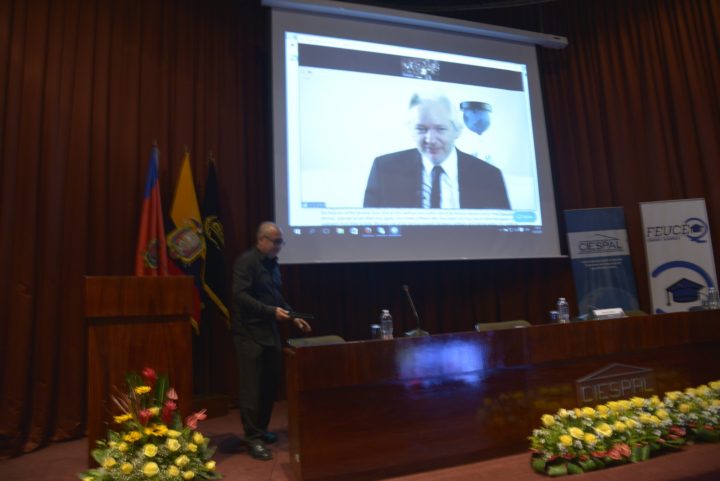A visibly moved and verbally grateful Julian Assange, spoke today, live via video conference to an audience in Quito, Ecuador at the headquarters of the International Higher Education Centre for Communication in Latin America, CIESPAL, during the week-long event, “Julian Assange: 4 years of denied freedom”.
Before starting the content of his lecture, Assange expressed his gratitude towards the President and people of Ecuador for taking a risk on giving him asylum in the Ecuadorian Embassy and how Ecuador’s faith in his case has been shown to be fully justified by the recent decision by the UN working group on arbitrary detention which agreed that he was being “arbitrarily detained” by the United Kingdom which has spent an estimated US $20 million on the police operation to keep him incarcerated.
The subject of his lecture was “From Wikileaks to the Panama Papers” and Assange was scathing of the coverage of the Panama Papers by the International Consortium of Investigative Journalists (the ICIJ) and their refusal to put everything in the public domain. In fact, “virtually nothing” would be a more accurate description of 200 out of 11.5 million documents published in full together with fragments of others.
Assange started his attack on the ICIJ by contrasting the way that Wikileaks operates. In the wikileaks model, according to the Australian, everything is published, and nothing censored and he later went on to proudly affirm that in all the 11 million documents published on their website, not one was ever denounced as false.
On the other hand, the case of the Panama Papers shows how the US elite has taken ownership of the leaked material and effectively repressed all external investigation into the papers’ contents except for those journalists who are willing to play by the ICIJ rules.
Assange explained that the problem with the ICIJ is that it is based in Washington D.C. and funded by the likes of George Soros and the Rockefeller foundation, and that the headline items that came out in the first days of the revelations attacking Vladimir Putin and the Russian establishment were funded by USAID; the United States Agency for International Development whose remit is to administer civilian foreign aid.
Assange also criticised the attacks by the ICIJ on wikileaks quoting, Gerard Ryle, the head of the ICIJ: “Wikileaks stole journalism and we are taking it back” and “the ICIJ is a responsible organisation. We are not Wikileaks”.
But Assange was quick to fire back the pointed question, “Responsible to who?”
Surely, Assange pointed out, if the entire database were to be published the ICIJ’s funding would evaporate given how many leading US figures, the CIA and many others use offshore accounts to hide the details of their financial dealings.
Assange argues that this archive of documents belongs to humanity so that everyone can see them: public prosecutors, intelligence agencies, tax collecting agencies and, most importantly, the general public.
When asked his thoughts about why such a small percentage of the information has been made public, Assange opined that the Suddeutsche Zeitung (the agency first provided with the material before being passed to the ICIJ) was probably scared of German law and of being sued by those with offshore accounts.
He also criticised the UK’s Guardian newspaper for its obsessive coverage of the Russian angle of the Panama Papers when the real story for the UK readership was the Prime Minister, David Cameron’s family involvement with offshore accounts. This fact was brought to light by Wikileaks reporting on the content made available publicly, before the Guardian chose to take up the story.
Assange theorised that the ICIJ has presumably restricted the people who can access the content, giving journalists from different countries only access to a few of the papers relevant to their own country. Another significant point is that the serious, anti-establishment journalists in places like Latin America are unlikely to have relationships with Washington-based institutions such as the ICIJ.
“Wikileaks is the rebel Library of Alexandria,” he asserted. “The Wikileaks database has been used to gain justice and shape political debate. The information in Wikileaks shows who people’s alliances really are,” he added.
As Assange said towards the end of his lecture, “Journalism is important but even more important is that there’s access [to this material] for the whole of society.”






